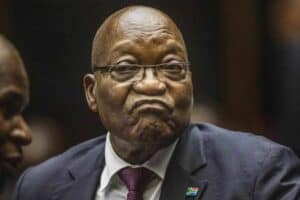Considering the possibility of Zuma's return and its impact on freedom, democracy, and governance in South Africa.

Imagine that Jacob Zuma’s sympathisers got their wish tomorrow. Not just “a presidential pardon” for all his corruption charges and contempt of court judicial conviction to pave his way to become a member of parliament, but the immediate “stepping down of Cyril Ramaphosa from the ANC and SA’s presidency”, and the restoration of an environment that enables their direct access to state power and ability to disperse patronage for personal gains.
How free would all citizens be in that future? Would a fresh tallying of numbers improve their satisfaction with these election results? Not if Ramaphosa is still in office – which almost certainly would be the case if an ANC-Democratic Alliance (DA)coalition is still on the cards.
And what if they achieve their larger goal – gaining direct access to state resources for personal gain?
This is not a speculative question. Zuma sympathisers had several political concerns about the shortcomings of the ANC leadership since 2017. These concerns were also expressed in the objections they lodged with the Electoral Commission of South Africa (IEC).
All indications are that a satisfactory resolution to them will come through political decisions taken outside IEC’s control. The intense pressure and unprecedented attacks on the IEC are deliberately calculated to delay the stages of forming governments and are the crucial initial steps towards their ultimate goal of removing Ramaphosa and gaining access to state resources.
The same concerns apply to ANC leaders with questionable integrity and naked intentions of looting state resources to fund their lavish lifestyles, instead of bettering the lives of the people.
ALSO READ: WATCH: Jabulani Khumalo ambushed by MK party supporters outside court
This is why, during a visit to the KwaZulu-Natal IEC Results Operation Centre, Cardinal Emeritus Wilfred Napier called on South Africans to pray for political parties to find each other, to form coalition governments that would prioritise service delivery over self-enrichment.
Zuma’s courage to object to the election results should not come as a shock, considering there’s a political leadership vacuum in KZN following the passing of King Goodwill Zwelithini and former Zulu tadtional prime minister and Inkatha Freedom Party leader Mangosuthu Buthelezi, resulting in many people in the province looking up primarily to Zuma for fatherly leadership.
In the eyes of the Zuma sympathisers, what will it take to accept these elections are free and fair?
In January, a pastor named by the party as Vader Maluleke, said to be representing some religious and traditional leaders, took the stage at an MK party rally, and said: “If the 2024 elections don’t give [MK] and Nxamalala [Zuma] a two-thirds majority and the ANC remains, we’re going to close South Africa for good. We want to say to the IEC that you had better do it the right way, or we are coming for you.”
Also in January, Zuma said: “We are going to the elections soon and there are people who believe the elections will be rigged. Some have information that the counting system will be changed to advantage a particular party.”
On Saturday, the Zuma sympathisers, through MK spokesperson Nhlamulo Ndhlela, accused the IEC and a Cape Town IT company of rigging the elections, resulting in slow processing of the long lines of voters and in the turning away of many voters who ended up unable to vote.
ALSO READ: WATCH: Jacob Zuma’s daughter Duduzile accused of forgery
They argue these and many other irregularities denied them a two-thirds majority – not just by denying voters their right to vote but also by denying parties an opportunity to observe the tallying of the election result slips.
Election observers from KZN Christian Council, Kagiso Trust, SA Development and Reconstruction Agency and others benefitted from information sharing with many party agents throughout the three voting days as we could compare the information observed inside voting stations, such as the number of ballot books used by midday or late evening.
This insight helped us direct observers to stations most likely needing high-visibility observers closer to 9pm and beyond into the vote-counting stage.
The frequent turning away of voters has been a long-running disgrace that dampened the election spirit on election day.
Glitches in the past have led the IEC to declare elections as “substantially free and fair”, to denote that they were not “absolutely free and fair”.
Civil society organisations led by the clergy are willing and available to mediate between parties to help find lasting solutions to ensure peace and political stability.
ALSO READ: Khumalo vs Zuma: Court to hear application by MK party founder
- Nkosikhulule Nyembezi is a policy analyst and a human rights activist.






